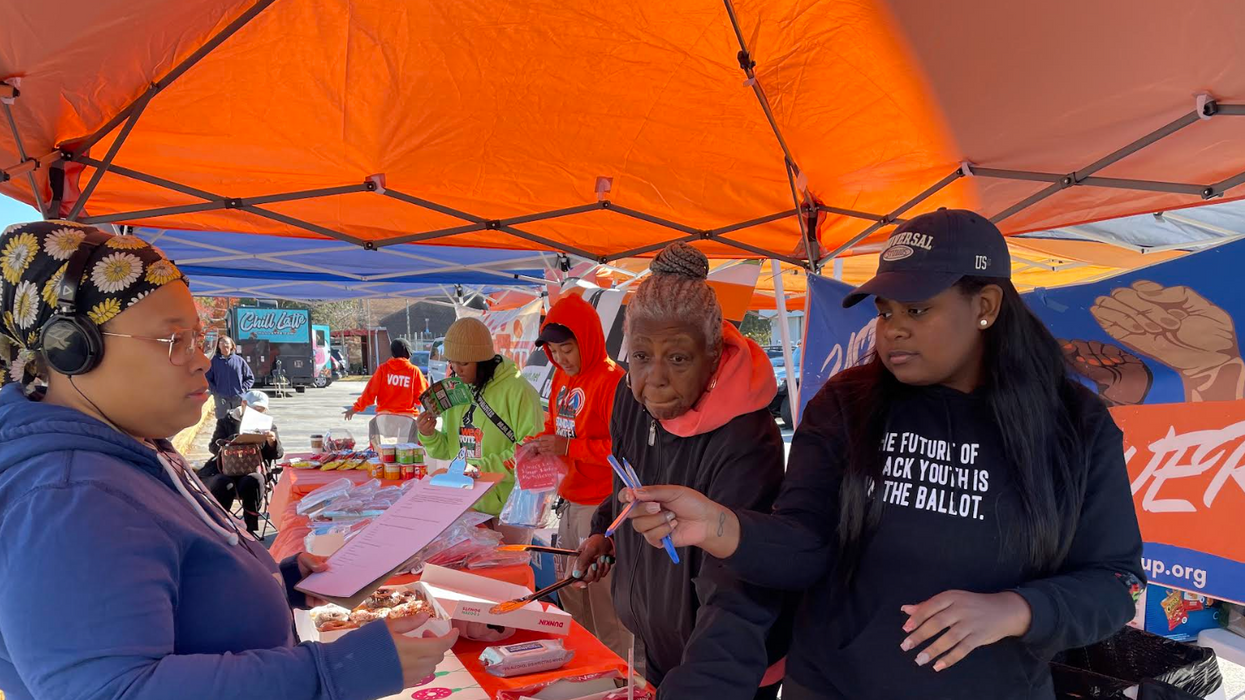Winning Georgia Senate Seat, Warnock Overcomes Final GOP Push
In a stunning finale to 2022’s midterm elections, Georgians reelected Sen. Raphael Warnock in a runoff that concluded Tuesday night, when the incumbent Democrat and Atlanta pastor defeated Herschel Walker, a football star who was handpicked by Donald Trump but rejected by the Peach State’s diverse urban and suburban voters.
With 99 percent of precincts reporting, Warnock had won by 95,000 votes out of more than 3.4 million votes cast, a margin of 2.8 percent in a race where Warnock campaigned vigorously on his accomplishments – and the state Democratic Party and many grassroots civil rights groups urged Georgians to vote. Walker, in contrast, sought to leverage his celebrity to be elected to high office, but his campaign was shadowed by disturbing revelations about his personal life and further impaired by dodging questions and making strange statements in speeches. He conceded the race before 11 p.m.
By the campaign’s close, Walker reverted to clichéd Republican talking points that mocked Democrats, while Warnock continued to speak of his state’s unmet needs and his hope that they could be addressed in Washington. Despite that contrast in substance and leadership capacities, the runoff’s margin underscored that Georgia’s Republican voters still are a formidable and loyal bloc in one of the country’s newest battleground states.
When Warnock took the stage after 11 p.m., he pledged to work for all Georgians in sermon-like remarks that framed his election as an affirmation of American democracy’s progress.
“It is my honor to utter the four most powerful words ever spoken in a democracy: the people have spoken,” he said. “I often say that a vote is a kind of prayer for the world we desire for ourselves and for our children. Voting is faith put into action. And Georgia, you have been praying with your lips and your legs; with your hands and your feet; your heads and your hearts. You have put in the hard work, and here we are standing together.”
Warnock, who was elected to a two-year term in 2020 that also required a runoff election, is the first Black Georgian to be elected to a full term as a U.S. senator. He noted how his parents had struggled under segregation, and how voter suppression was still very much alive in his state.
“There are those who would look at the outcome of this race and say that there is no voter suppression in Georgia,” Warnock said. “Let me be clear. Just because people endured long lines that wrapped around buildings, some a block long; just because they endured the rain and the cold, and all kinds of tricks in order to vote, doesn’t mean that voter suppression does not exist. It simply means that you, the people, have decided that your voices will not be silenced.
“Let us not forget that when we entered this runoff, in a vestige of the ugly side of our complicated American story, state officials said that we couldn’t vote on Saturday,” Warnock continued. “But we sued them, and we won. And the people, once again, rose up in a multi-racial, multi-religious coalition of conscience… and you voted because you believe as I do.”
Warnock was referring to a mid-1960s state law that required a runoff when no candidate won more than 50 percent of the vote. That law was adopted to try to keep Black candidates from winning office. Georgia Secretary of State Brad Raffensperger, a Republican, initially said that GOP-authored election law modifications adopted in 2021 (after Democrats won the state’s presidential and senatorial elections) barred Saturday voting in a shortened runoff season.
Ironically, various provisions in that GOP-drafted law, as well as Trump’s proclamations that the only votes that should count are those cast in person on Election Day, probably undermined Republican turnout during the runoff. As the results trickled in, it was clear that many more Democrats than Republicans took advantage of voting before Election Day, as well as using mailed-out ballots. Moreover, the weather on Tuesday across metro Atlanta and surrounding counties, where most of the state’s voters from both major parties are concentrated, was dismal – foggy, damp, and cold. Such conditions often depress turnout, especially among older voters, who are a key GOP constituency.
As the runoff came to a close, Republican strategists said that Walker needed voters in GOP-majority rural counties to turn out in comparable or slightly better numbers than in November’s general election, where he trailed Warnock by 38,000 votes. (A Libertarian candidate prevented any contender from winning more than 50 percent.) Walker also needed to boost his numbers by roughly five percent in metro Atlanta counties, where Gov. Brian Kemp, a Republican who was re-elected in November, received tens of thousands more votes than the football star.
While Republicans predicted that Kemp’s last-minute efforts to boost the former football hero's candidacy could prove pivotal, Walker never obtained the votes that he needed in the Atlanta region. In rural areas, by contrast, Walker’s support remained strong. Yet Warnock didn't lose votes in rural counties and saw his support grow in the state’s metro regions.
Visits to precincts north of Atlanta where Walker hoped to increase his support – because Kemp won by large margins – hinted that he would fall short. In a half-dozen precincts in Cobb County, a stretch of suburbs on Atlanta’s north side, the turnout was steady but generally not crowded. There were hardly any elderly voters visible. And voters repeatedly said that neither last-minute campaign ads for both candidates nor Kemp’s efforts on Walker’s behalf changed many voters' intentions.
“People had their mind made up,” said Amie Carter, who works in technology sales. “Spending all that money on paper and TV ads was probably not very influential.”
Monica Brown, a Black social scientist who worked to turn out Black voters in Cobb County, said Walker’s history of domestic violence and buffoonish campaign trail antics mortified many people in communities of color.
“When we think of Black excellence – this notion that you have to be more prepared, better – in this particular race, where was that excellence?” she asked. “We cannot afford to lessen it. What is the rationale for picking this guy?”
Steven Rosenfeld is the editor and chief correspondent of Voting Booth, a project of the Independent Media Institute. He has reported for National Public Radio, Marketplace, and Christian Science Monitor Radio, as well as a wide range of progressive publications including Salon, AlterNet, The American Prospect, and many others.
This article was produced by Voting Booth, a project of the Independent Media Institute.












